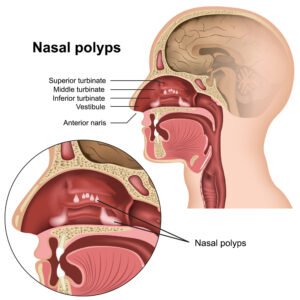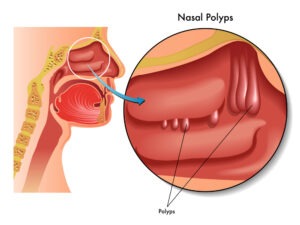It can be scary when you can’t breathe easily. If your nose seems to be constantly stopped up, you may find yourself gasping for air or forced to constantly breathe through your mouth.
It might be that you’re suffering from a common cold, sinus infection, or nasal polyps. When you have breathing problems, you need to visit a nose and sinus doctor, and they can make the determination as to the cause of the issue. Here’s more information on breathing problems due to nasal polyps.
What Are Nasal Polyps?

Larger nasal polyps can block your nasal and sinus cavities making it difficult to breathe through your nose and also causing significant sinus issues. When this happens, you’ll know it’s time to see a nose and sinus doctor.
What Are the Signs and Symptoms of Nasal Polyps?
Many people have nasal polyps, but because they’re small, the individual doesn’t know that the polyps are there. Here are a few signs or symptoms that might indicate nasal polyps:
- Nosebleeds
- Toothache in upper teeth
- Frequent runny nose
- Snoring
- Sinus pressure and pain especially along your cheeks, under the eyes, and above the eyebrows
- Lost or diminished sense of smell
- Reduced sense of taste
- Frequent or prolonged sinus infections
- Stuffy nose
- Postnasal drip
- Persistent cough
Of course, many of these symptoms are common for colds, the flu, and other infections. However, if your symptoms persist for an extended periods of time (usually over 2 weeks), your sinus doctor may start looking for nasal polyps as the cause. By the use of nasal scopes in the office or a sinus CT scan, your sinus specialist can determine if you have nasal polyps.
What Are Some Common Risk Factors?
Not everyone develops nasal or sinus polyps. There are certain risk factors that make it more likely that you’ll develop them. In fact, if your sinus doctor suspects nasal polyps, they’ll review these factors to determine the likelihood of polyps. Here are a few risk factors to consider:
- Sensitivity to aspirin
- Cystic fibrosis which creates thick mucus in the nasal passages and sinus cavities
- Asthma which inflames airways
- Vitamin D deficiency
- Environmental allergies
- Churg-Strauss syndrome, which causes the blood vessels to become inflamed and is a rare condition
- Family history of sinus problems or nasal polyps
If you have any of these risk factors, you doctor is probably already aware of them. However, if you’re displaying any of the symptoms above, it’s worth reminding him of your additional risk factors for nasal polyps.
What Are Some Common Breathing Issues Due to Nasal Polyps?

Snoring and/or Sleep Apnea
Many individuals who cannot breathe through their nose properly at night will snore. Many snorers can also have sleep apnea which is a serious medical condition that can be caused by nasal polyps. These polyps block the flow of air while you’re asleep, and you can’t breathe. When your subconscious realizes that you’re no longer breathing, it wakes you up by causing you to gasp for air.
This condition is dangerous and needs to be treated as soon as you realize that you have a problem. As such you will need the polyps removed and your nasal way opened up by an expert like Dr. Alen Cohen to resolve this condition.
Acute or Chronic Sinusitis
Almost everyone gets the occasional sinus infection, especially during allergy season. Your nasal passages fill up with mucus for days on end leading to colored discharge and facial pain, and it can become hard to breathe without keeping your mouth open. This is acute sinusitis, and you might find that nasal polyps are a contributing factor to the condition. This usually treated with antibiotics, saline rinses, decongestants and nasal sprays like Flonase etc.
However, chronic sinusitis is a condition, where you have a sinus infection that lasts more than 12 weeks. This type of infection does not resolve with antibiotics or other treatments and you won’t typically run a fever or have colored discharge, but will feel run-down, constant headaches or facial pain and constantly congested.
Many cases of chronic sinusitis are the result of nasal or sinus obstruction due to nasal polyps or a deviated septum. In some cases, it’s both. You can get a surgical procedure done that addresses both issues at the same time.
Asthma
Many people who suffer from asthma, a breathing issue that inflames your airways, also have nasal polyps. Asthma is a very serious medical condition that can lead to hospitalization and even death. It’s typically treated with daily medication and inhaled steroids. Many people with asthma carry a rescue inhaler for sudden flare-ups. If nasal polyps are a contributing factor, they need to be removed.
What Treatments Are Available for Nasal Polyps
If you have multiple polyps or large ones with breathing issues or other medical conditions, your doctor might recommend treating them. There are a couple of treatments available for nasal polyps, including:
Medication
Your doctor might try to treat your nasal polyps with medications before taking more invasive steps. The most common medication used to treat nasal polyps is daily intranasal steroid sprays and rinses. The two most common prescriptions include Flonase and Nasacort.
These medications are typically used when you have small nasal polyps. If medications fail or the polyps continue to return, your doctor might recommend that you take more invasive measures to remove the polyps.
Surgical Procedures
If your polyps are too large or treatment with medications hasn’t worked, you might be a candidate for a surgical procedure. There are a couple of options that might work, depending on your particular case. These include:
Balloon Sinuplasty and Polypectomy
This is an in-office procedure under local anesthesia just like going to the dentist. Dr. Cohen places a balloon-style tool inside your nasal and sinus passages and inflates it. This is done several times to enlarge the area by changing the bone structure. During this procedure, Dr. Cohen will almost always include image-guided endoscopic sinus surgery to remove the polyps.
Septoplasty with Image-guided endoscopic sinus surgery
This surgical procedure is completed while you’re under anesthesia in an outpatient surgery center and has a recovery time of three to four days. Dr. Cohen will remove the polyps completely and fix a deviated septum, septoplasty, or other issues blocking your nose and sinuses.
When you need to have a surgical procedure to remove nasal polyps, Dr. Cohen, a world-renowned expert in nose and sinus surgery and his team are ready to help. Contact us today to learn more.

